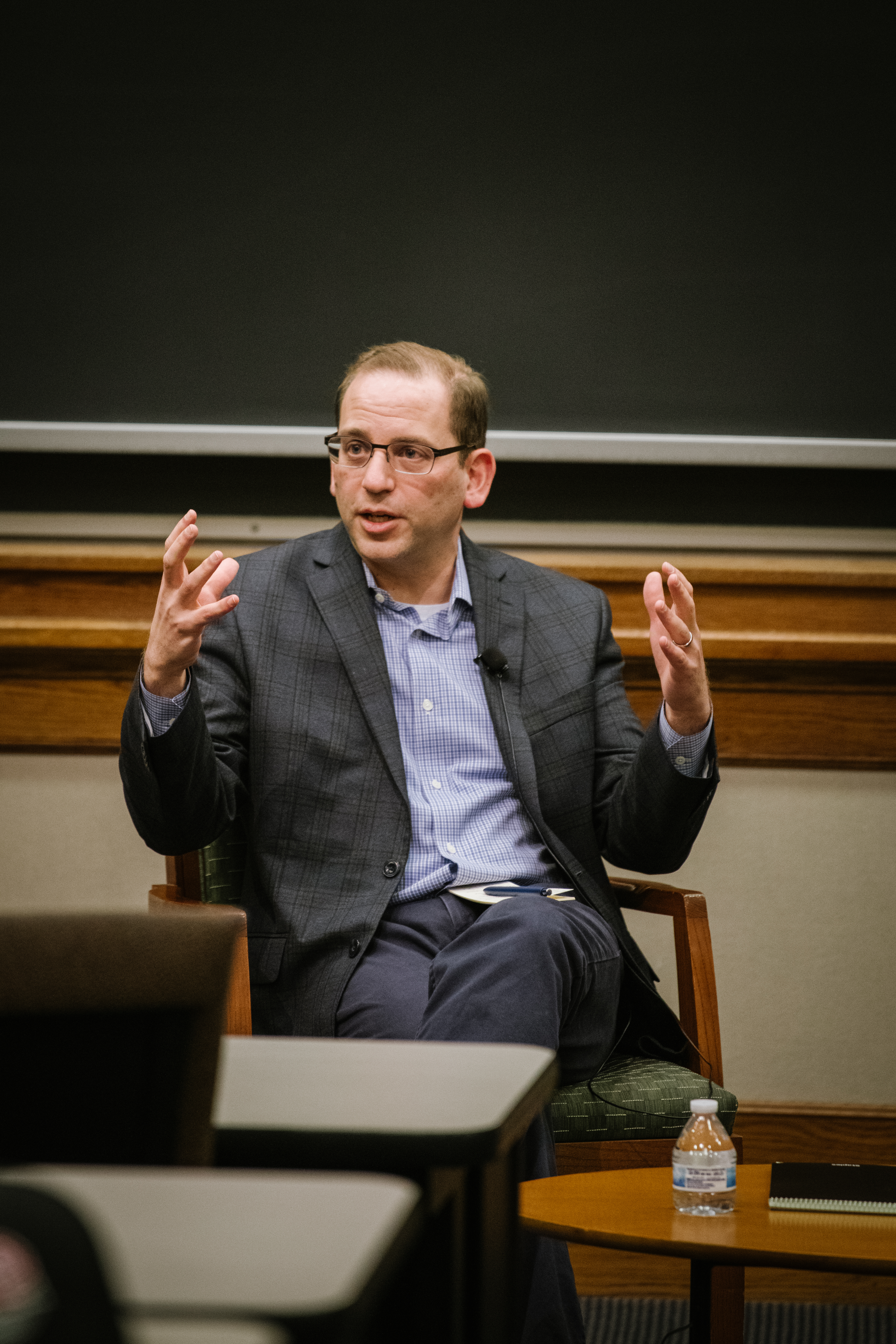
How do I affect change in the world?
It’s a question Charles Luftig pondered 25 years ago as a political science major at the University of Michigan.
On April 10, he returned to his alma mater, only to be asked the same question by students who are considering following in his footsteps.
During a fireside chat with Associate Professor of Practice Javed Ali at the Gerald Ford School of Public Policy, Luftig reflected on how so many people asking this same question end up in the Intelligence Community.
“It’s about being able to make the world just a little bit better, a little bit safer, and in very small ways, but in a way that I wouldn’t otherwise have the opportunity to do,” said Luftig, who serves as Deputy Director of National Intelligence for Policy and Capabilities. “You have a set of people who have come to a community because they believe in something bigger than themselves and they want to make a slightly better, more just world and (they’ve) come together to do that. And I just think being a part of that is the most rewarding thing.”
Luftig reports directly to Director of National Intelligence Avril Haines and is responsible for ensuring that the IC has the strategies, policies, and capabilities it needs to succeed in a complex threat environment.
He returned to the University of Michigan to discuss ODNI’s place in the IC, how the IC is positioned for the future, and to encourage public policy students to consider IC careers.
“The students’ questions were incredibly impressive and the depth of their knowledge on particular topics was frankly far beyond expectations, and it made the fireside chat Q&A really interesting and fun,” said Luftig, who was asked about the importance of FISA 702 being reauthorized and how the IC and policymakers view dissent on views within the IC.

After a student asked about U.S. policy on the war in Gaza following Luftig’s fireside chat with Ali, Luftig discussed the important line between the IC’s work and that of policymakers.
“From the Intelligence Community perspective, of course, we don’t control the policy – the policymakers do. Our job is to provide the best information that we can about what we are seeing and to answer questions as they come to us, and to not hold back on our assessments in terms of what we see as near-term or long-term consequences of what is happening.”
Luftig called the Russia-Ukraine crisis a turning point for the IC’s views on strategic declassification that has the IC more willing to see if that model can work in other areas.
“Even though we didn’t ultimately stop the invasion, we feel like we provided warning and our partners and allies were better postured to partner with the policy community after the invasion in order to respond effectively in a way that I’m not sure would’ve happened had we not given them the warning that we did, not just (to) their governments, but frankly their people,” he said.

But doesn’t that run the risk of the IC being viewed as politically motivated, a student asked? Luftig discussed red lines the IC follows to avoid that perception.
“When we declassify information, we in the Intelligence Community are focused on (whether) we can say this and protect sources and methods. We are not focused on (whether) policymakers agree with this,” said Luftig. “As soon as we start saying things that policy wants us to and not saying things they don’t want us to, we are going to lose our credibility and we are not going to be believable because it seems like we have a dog in the fight, which we can’t if we are going to speak truth to power.”
Ali said those who support policy in the IC, as he also once did, are bound to get criticized by policymakers on one side of the aisle or the other.
“But you don’t shy away from what you are supposed to do,” said Ali.
Following the fireside chat, Luftig spoke to Ali’s intelligence policy class about how the 2023 National Intelligence Strategy was constructed. He explained that it started organically with discussions among IC leaders about what they believed were critical principles and priorities that should drive the IC’s focus over the next four years.

During a morning career conversations session, students asked how to find the right first job in the IC. Students and educators noted how intimidating a job search can be when they don’t know the missions of all 18 IC elements and that many IC job descriptions only provide vague backgrounds on what the position really entails.
Luftig encouraged the students to be flexible about where they get started.
“A lot of people get their foot in the door in one place (in the IC), get a sense of who is who and where things are happening, and then move laterally,” he said. “We have a lot of lateral movement in the Intelligence Community.”
The students were also informed about IntelligenceCareers.gov, which provides background about each IC element and sorts posting by career fields. For those unsure where they could fit in, the site’s job exploration tool questionnaire can provide recommendations based on education, experience, interest, and work environment.
“The students who attended the different sessions with Deputy Director Luftig valued his insights since many are already examining national security topics in the classroom or are beginning to think about possible careers once graduating,” said Ali.




